Istanbul new year Reina nightclub attack 'leaves 39 dead'
- Published
Bullets are seen being fired by the gunman - and flying off passing cars
At least 39 people, including at least 15 foreigners, have been killed in an attack on a nightclub in Istanbul, Turkey's interior minister says.
A gunman opened fire in Reina nightclub at about 01:30 local time (22:30 GMT), as revellers marked the new year.
Suleyman Soylu said efforts were continuing to find the attacker, who was believed to have acted alone.
At least 69 people were being treated in hospital, the minister added. Four were said to be in a serious condition.
Turkish President Recep Tayyip Erdogan said the attackers were trying to "create chaos" and pledged to "fight to the end" against terrorism.
'Different countries'
Addressing reporters early on Sunday, Mr Soylu said: "This was a massacre, a truly inhuman savagery.''
"A manhunt for the terrorist is under way. Police have launched operations. We hope the attacker will be captured soon."
Only 21 of the victims had been identified, he said. Fifteen or 16 were foreigners, he said, and at least three of the Turkish victims may have been employees at the club.
Several hours later, Israel confirmed one of its citizens, 19-year-old Leanne Nasser, was among the dead.
Turkish state news agency Anadolu also quoted Family Minister Fatma Betul Sayan Kaya as saying most of the dead were foreigners "from different countries - Saudi Arabia, Morocco, Lebanon, Libya".
Turkey attack survivor: "There were bodies on the floor"
Eyewitness Ismail Celebi was nearby when the attack happened
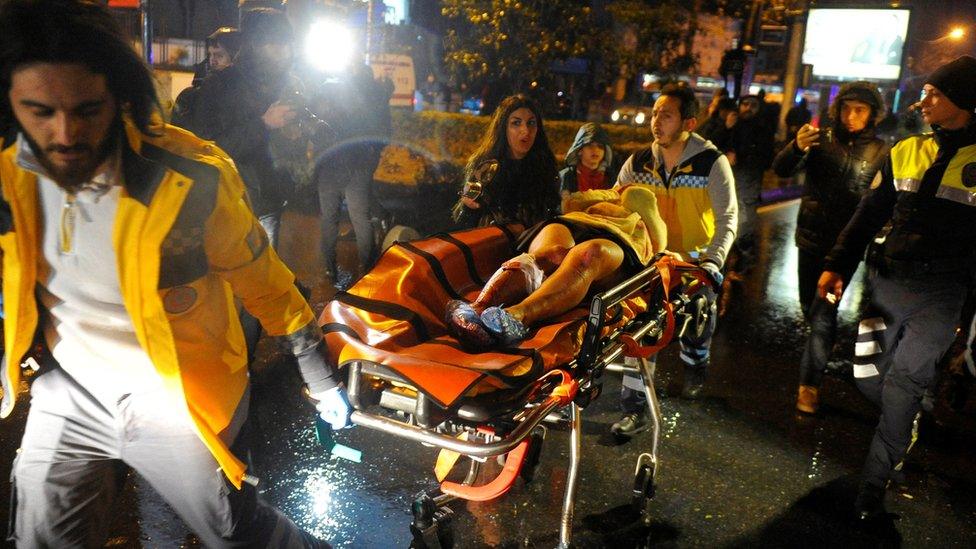
At least 69 people were injured in the attack
Early media reports suggested the attacker may have been wearing a Santa Claus outfit, but newly-obtained CCTV footage shows the suspected attacker in a black coat outside the club.
Mr Soylu said the gunman was wearing a coat and trousers, but "we were informed that he was wearing different clothes inside".
'Several bodies'
Reina nightclub, in the the Ortakoy area of Istanbul, is an upmarket venue on the banks of the Bosphorus.
Istanbul Governor Vasip Sahin said the attacker killed a policeman and a civilian outside the club before entering and opening fire.
"Before I could understand what was happening, my husband fell on top me,'' the Associated Press news agency quoted Sinem Uyanik, who was inside the club, as saying.
"I had to lift several bodies from (on) top of me before I could get out. It was frightening.''
There were reportedly as many as 700 people in the nightclub at the time of the attack, some of whom jumped into the water to escape.
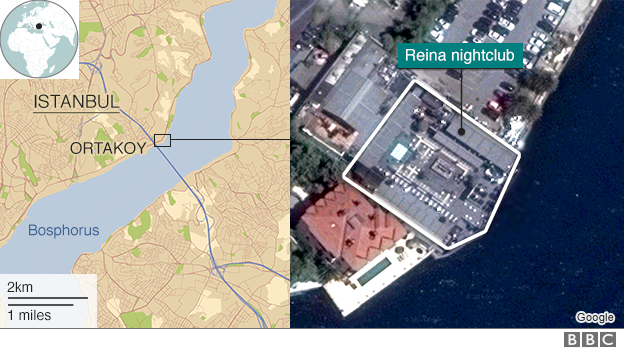
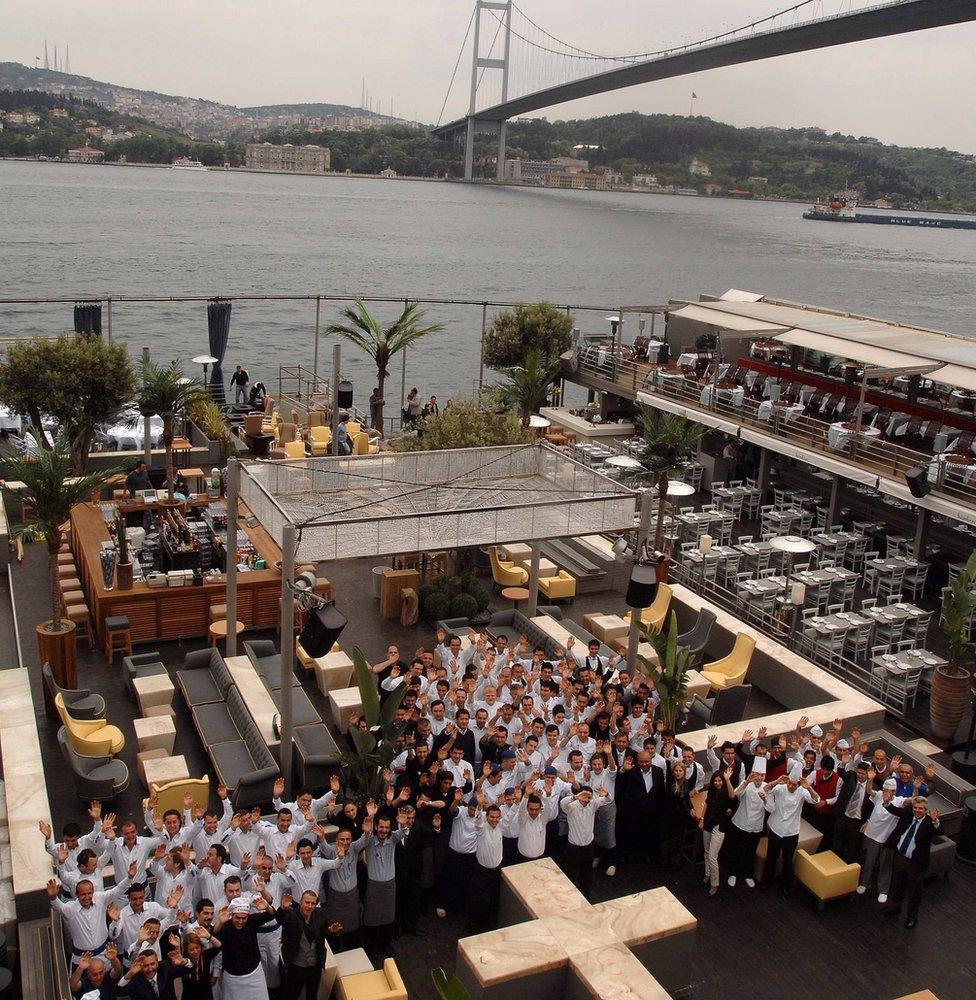
Reina nightclub, seen here in a file picture, is one of the most exclusive in Istanbul
The Turkish authorities have imposed a media blackout on coverage of the attack, citing security and public order concerns, but it does not extend to official statements.
Some media reports spoke of more than one attacker and Dogan news agency reported that some witnesses claimed the attackers were "speaking Arabic", but there is no confirmation of this.

IS threats: By Rengin Arslan, BBC Turkish, Istanbul
Despite there being no official statement about who might be behind this brutal attack, the finger of blame is being pointed at the so-called Islamic State.
In the last two years of attacks in Turkey, Kurdish militants have mostly targeted military forces and police, while IS is known to target civilians.
IS leaders have threatened Turkey and called on their followers to carry out attacks inside the country.
Turkey began a ground operation against IS as well as Kurdish groups inside Syria four months ago.

In a statement, President Erdogan condemned those trying to "demoralise our people and create chaos with abominable attacks which target civilians".
"We will retain our cool-headedness as a nation, standing more closely together, and we will never give ground to such dirty games."
US President Barack Obama, who is on holiday in Hawaii, was among the first international leaders to make a statement after being briefed by his team.
"The president expressed condolences for the innocent lives lost, directed his team to offer appropriate assistance to the Turkish authorities, as necessary, and keep him updated as warranted," White House spokesman Eric Schultz said in a statement.
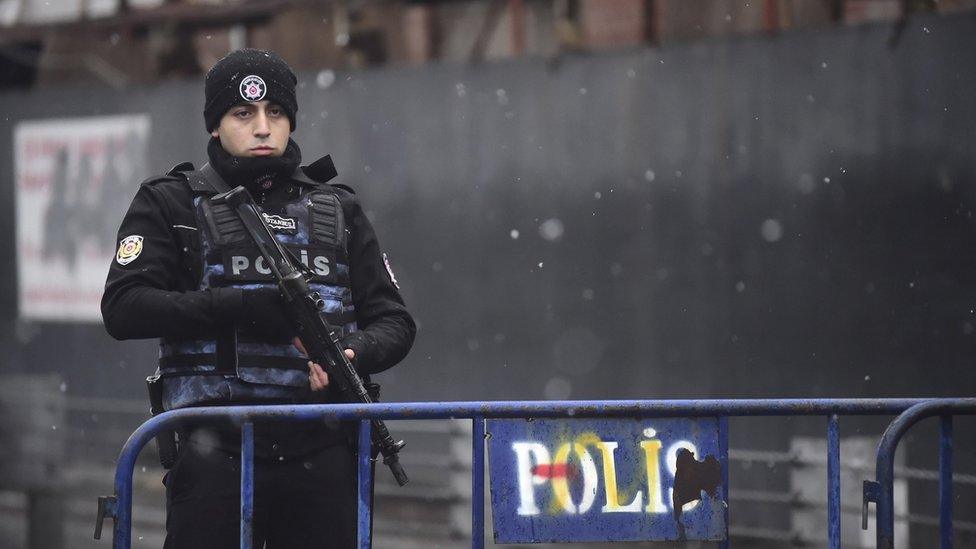
Police are searching the city for the attacker, who left the scene
Russian President Vladimir Putin condemned the "cynical" murder of civilians. "Our shared duty is to decisively rebuff terrorist aggression," he said in a telegram quoted on the Kremlin website.
Turkey and Russia are working together on efforts to end the fighting in Syria, though they support different sides in the conflict.
Istanbul was already on high alert with some 17,000 police officers on duty in the city, following a string of terror attacks in recent months.
Many were carried out by so-called Islamic State (IS) or Kurdish militants.
Less than a fortnight ago, Russian Ambassador Andrei Karlov was shot dead by off-duty Turkish policeman Mevlut Mert Altintas as he gave a speech in the capital Ankara.
After the shooting, the killer shouted the murder was in revenge for Russian involvement in the conflict in the Syrian city of Aleppo.

Deadly attacks in Turkey in 2016

Scene of explosion in Ankara's central Kizilay district on 13 March
10 December: Twin bomb attack outside a football stadium in Istanbul kills 44 people, Kurdish militant group claims responsibility
20 August: Bomb attack on wedding party in Gaziantep kills at least 30 people, IS suspected
30 July: 35 Kurdish fighters try to storm a military base and are killed by the Turkish army
28 June: A gun and bomb attack on Ataturk airport in Istanbul kills 41 people, in an attack blamed on IS militants
13 March: 37 people are killed by Kurdish militants in a suicide car bombing in Ankara
17 February: 28 people die in an attack on a military convoy in Ankara

Were you in the area or have you been affected by this incident? Share your experiences by emailing haveyoursay@bbc.co.uk, external.
Please include a contact number if you are willing to speak to a BBC journalist. You can also contact us in the following ways:
WhatsApp: +44 7525 900971
Send pictures/video to yourpics@bbc.co.uk, external
Tweet: @BBC_HaveYourSay, external
Send an SMS or MMS to 61124 (UK) or +44 7624 800 100 (international)
- Published27 December 2016
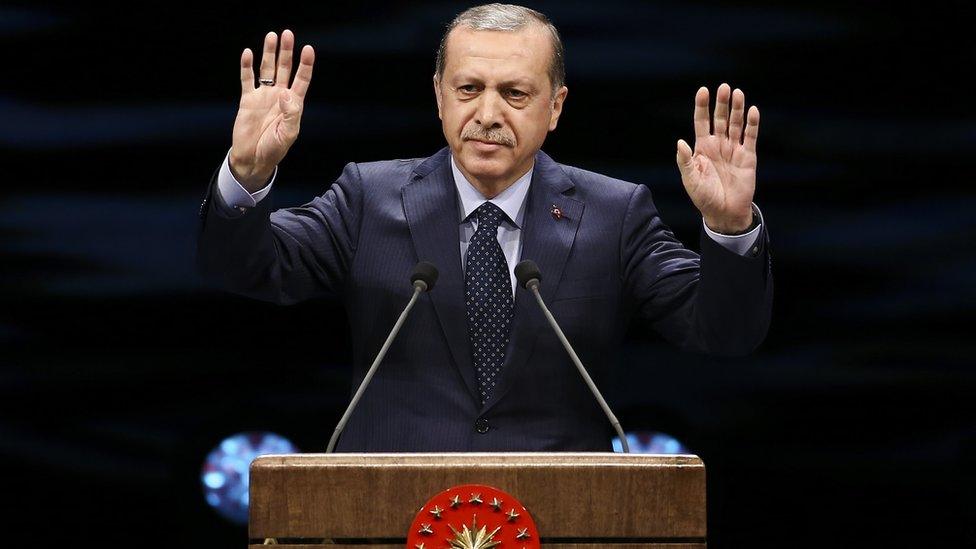
- Published5 January 2017
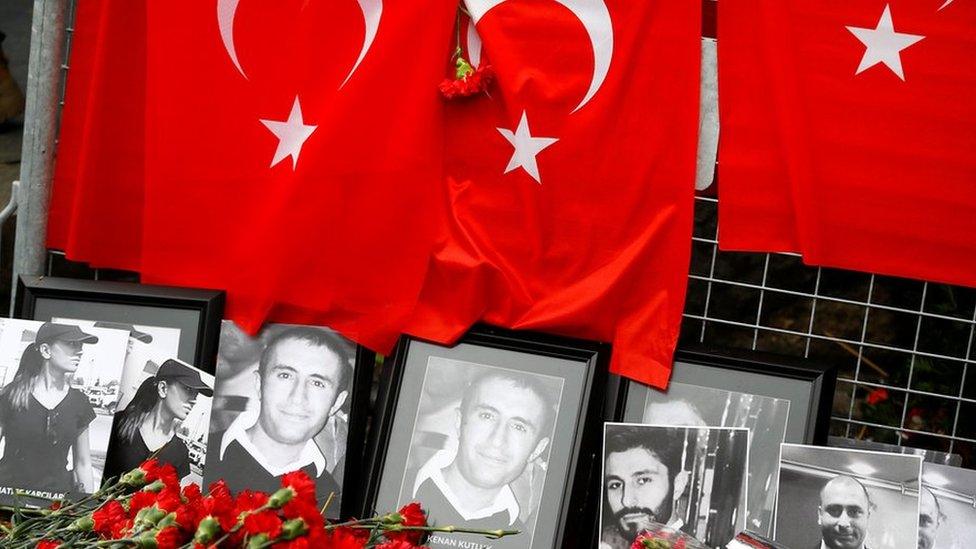
- Published22 August 2023
